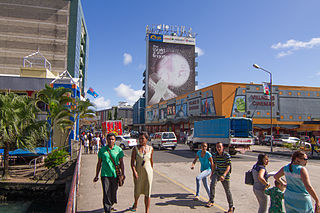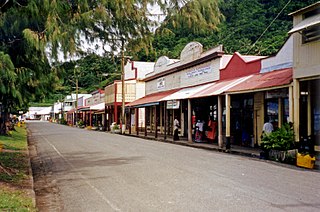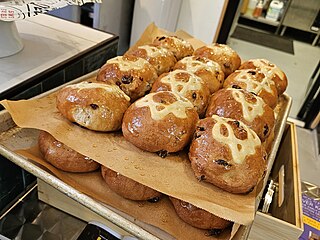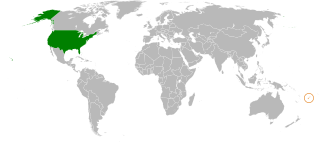| Total population | |
|---|---|
| 60 [1] | |
| Regions with significant populations | |
| Suva | |
| Languages | |
| English, Hebrew, Fijian, Fiji Hindi | |
| Religion | |
| Judaism |
| Part of a series on |
| Jews and Judaism |
|---|
The history of the Jews in Fiji is intertwined with the settlement of the Fiji islands by European explorers and settlers. Most of these settlers arrive in Fiji via Australia and New Zealand.[ citation needed ]
The population of Fiji is 905,949 (July 2006 estimate) with approximately 60 Jews. In addition, there are close to 300 people of Jewish descent living in the Fiji Islands, principally in the capital city of Suva. There are currently three cemeteries in Fiji, located in Momi (private cemetery), Ovalau Island (Levuka), and Suva (old cemetery) with Jewish inscriptions on the tombstones, dating back to the first Jewish settlers in the 19th century.
One of the early settlers was a merchant by the name Alexander Schmerrill Bowman (Hebrew name Alexander ben Shmuel) who was born on 9 Jan 1847 in Schneidemuhle, Prussia, (modern-day Pila in Poland) and died 1909 in Sydney, New South Wales, Australia. Bowman was of the firm Bowman and Abrahams of Levuka and Lomaloma. When he settled in Levuka, the former Capital of Fiji, he married Sara Annette Solomon on 25 July 1877 in Levuka, Fiji. She was the daughter of Phillip Solomon and Catherine Cohen. She was born 27 September 1857 in Auckland, New Zealand, and died 1915 in Sydney. [2]
Another well-known figure was 20-year-old Henry Marks who arrived in 1881 from Australia. Marks laid the foundation of what became one of the most extensive commercial enterprises in the Western Pacific.
Until the recent establishment of the Fiji Jewish Association there was little organized activity among the Jewish population. There remains limited religious life among these Jews. The Israeli Embassy holds an annual Passover Seder, which accommodates 50 to 60 people. Kosher food is imported from Australia.
Israel and Fiji enjoy full diplomatic relations. In May 2002, the then Fiji Prime Minister, Laisenia Qarase, himself of partial Jewish ancestry, [3] agreed with the Israeli Ambassador, H. E. Ruth Kahanoff that the two countries should strengthen their ties though they are so far apart geographically. While there is an Israeli Embassy in Fiji, the Israeli Ambassador in Canberra, Australia represents Israeli interests in Fiji.

Fiji has experienced many coups recently, in 1987, 2000, and 2006. Fiji has been suspended various times from the Commonwealth of Nations, a grouping of mostly former British colonies. It was readmitted to the Commonwealth in December 2001, following the parliamentary election held to restore democracy in September that year, and has been suspended again because of the 2006 coup, but has been readmitted a second time after the 2014 election. Other Pacific Island governments have generally been sympathetic to Fiji's internal political problems and have declined to take public positions.

Suva is the capital and largest city of Fiji. It is the home of the country's largest metropolitan area and serves as its major port. The city is located on the southeast coast of the island of Viti Levu, in Rewa Province, Central Division.

Levuka is a town on the eastern coast of the Fijian island of Ovalau, in Lomaiviti Province, in the Eastern Division of Fiji. Prior to 1877, it was the capital of Fiji. At the census in 2007, the last to date, Levuka town had a population of 1,131, about half of Ovalau's 8,360 inhabitants. It is the economic hub and the largest of 24 settlements on the island. Having been nominated decades prior, Levuka was designated a UNESCO World Heritage Site in June 2013, in recognition of the port town's exceptional testimony to the late colonial port towns in the Pacific.

The Catholic Church in Fiji is part of the worldwide Catholic Church, under the canonical authority and spiritual leadership of the Pope of Rome.

New Zealand Jews, whether by culture, ethnicity, or religion, form with Hawaii (8,000–10,000), the joint-second largest (7,500–10,000) Jewish community in Oceania, behind Australia (118,000).

Australian rules football in Oceania is the sport of Australian rules football as it is watched and played in the Oceanian continent. The regional governing and development body is AFL South Pacific it is affiliated to the AFL Commission and was formed in 2008.

Oceania is, to the People's Republic of China and the Republic of China, a stage for continuous diplomatic competition. The PRC dictates that no state can have diplomatic relations with both the PRC and the ROC. As of 2024, eleven states in Oceania have diplomatic relations with the PRC, and three have diplomatic relations with the ROC. These numbers fluctuate as Pacific Island nations re-evaluate their foreign policies, and occasionally shift diplomatic recognition between Beijing and Taipei. The issue of which "Chinese" government to recognize has become a central theme in the elections of numerous Pacific island nations, and has led to several votes of no-confidence.

The bilateral relations between the Fiji and the United States have improved significantly since Fiji's elections in September 2014, which restored a democratically elected government to Fiji for the first time since 2006. The United States had opposed Fiji's unelected government, which came to power through a military coup in December 2006.

The history of Jews in Myanmar,, begins primarily in the mid-19th century, when hundreds of Jews immigrated from Iraq during the British colonial period. Cochin Jews came from India and both groups were part of the development of the British Empire, becoming allied with the British in Burma. At its height in 1940 the community of Jews in the country stood at 2,500 members.
The history of the Jews in Oceania starts with early explorers, sealers and whalers. Jewish and other settlers arrived in Oceania from the eighteenth century. They settled in Australia and New Zealand, and then on the smaller islands of Oceania.

Fiji and South Korea established official diplomatic relations in January 1971, Korea having recognised Fiji's accession to independence the previous year. There is a South Korean embassy in Suva and a Fijian embassy in Seoul. Fiji opened its embassy in Seoul in July 2012 to "foster trade and investment" and to "promote people-to-people exchanges".
Cuban-Pacific relations are diplomatic, economic, cultural, and other relations between the Cuba and countries situated in Oceania. In the 2000s, Cuba has been strengthening its relations with Pacific nations, which have, for the most part, responded favorably to Cuban medical aid in particular. The first Cuba-Pacific Islands ministerial meeting was held in September 2008 in Havana, with government members from ten Pacific countries—Kiribati, Tuvalu, Nauru, Solomon Islands, Fiji, Tonga, Vanuatu, Samoa, the Federated States of Micronesia and Papua New Guinea—attending. The meeting was a consolidation rather than a starting point of Cuban-Pacific relations.

Francis Herbert Dufty II, who was also known as Frank Dufty, was an English-born, Australian photographer, known for his photographs of Fiji. Dufty's contribution to Fiji was of primary importance in the 1870s, and he was one of Fiji's most significant, early photographers.

Naval Base Fiji was a naval base built by the United States Navy in 1942 to support the World War II effort. The base was located on Fiji in the Central Pacific Ocean. The base was built as one of many advance bases in the island-hopping campaign towards the Empire of Japan. The US Navy built seaports, seaplane bases and airfields used for staging in the Pacific War.
He was from Vanua Balavu in northern Lau and had native Fijian, Tongan, and Jewish ancestry.